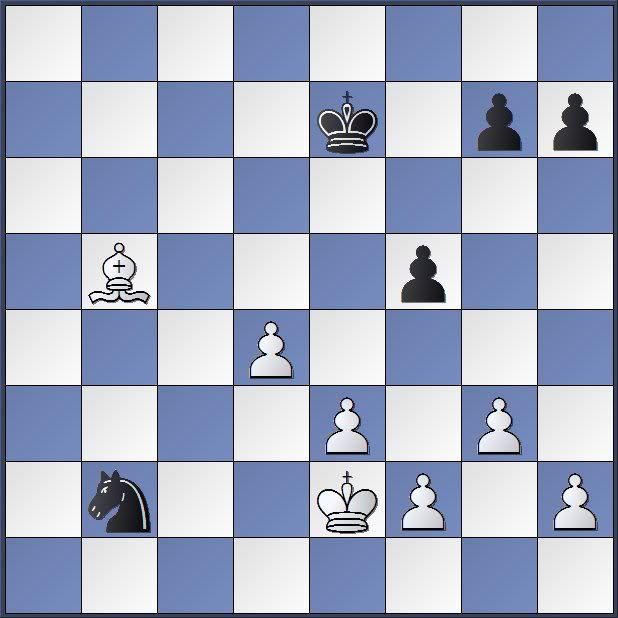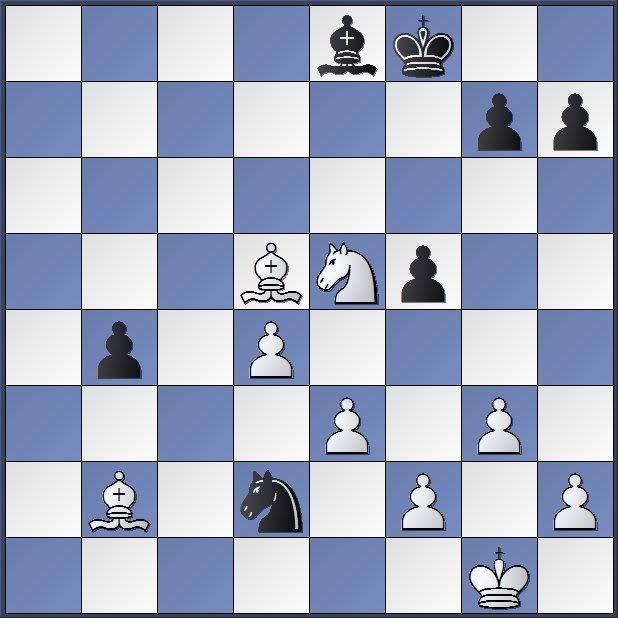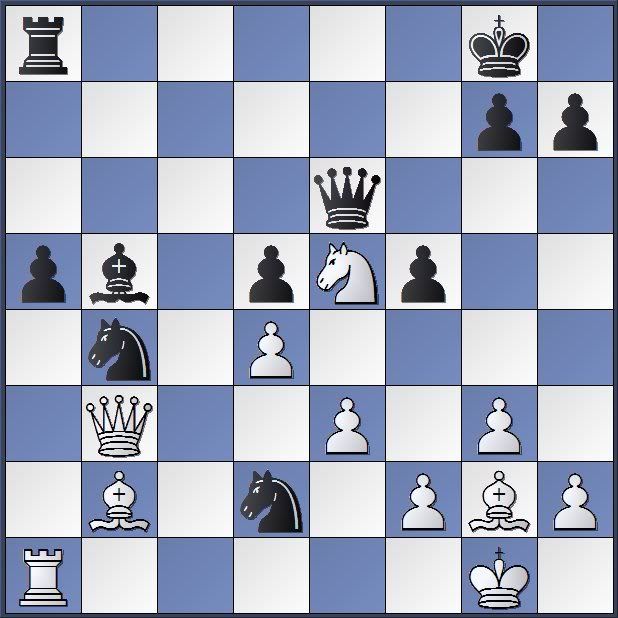Black to move +-

This position came about after an inaccuracy from this position.
White to move +-

5.f3 appears best, but I played 5.Nc6 forcing Black's bishop off the board. The bishop's domination of the knight came about as Black gained back some of the material. 5...Bxc6 6.Bxc6 Nc4 7.Bc1 b3 8.Kf1 b2 9.Bxb2 Nxb2 10.Ke2 Ke7 11.Bb5
The process started from Reinfeld's WCSAC #0669
White to move +-

1.Qxb4!
This move is reminiscent of the key in Robert Pearson's "A Nice Tactic (Redux)," although not nearly as rich. Even so, it occurred to me in a matter of seconds partly because I'd been looking at Pearson's blog the day prior.
1...axb4 2.Rxa8+ Qe8 3.Rxe8+ Bxe8 4.Bxd5+ Kf8 and we reach the position at the top.
Resolutions Update
I publicized three chess oriented New Year's resolutions.
1. Reduce blitz
I've played four blitz games in 2009; all yesterday. I won a lost game on time, lost a won game against the same opponent due to inaccuracies when hurrying. I won two other games against a weak opponent on another site--almost a waste of time.
2. Intensify endgame training
I wrote on my Facebook page on January 4 that I was building a database of pawn endgames. I did some endgame training each day of 2009 up to then, but none since.
3. Demand consistency in Tactics Training Plus
I've done half of my planned regimen.
Why have I failed? Most of my chess time has been devoted to two activities: my correspondence game load, and the forums at some of these sites. The chess has been productive, but the political discussions have been almost stupid. Better management of idle time will lead to better results in my personal goals.
I did complete nine turn-based games, which reduced my load by seven. I accepted a rematch from one opponent, and accepted a challenge from one of this blog's readers. In these nine completed games, I won seven. The other two were drawn: one draw was a comeback from a technically lost position. In the other, I failed to hang on to an extra pawn, and started to think that I was slightly worse in the queen and pawn endgame. We repeated the position and I claimed the draw.
Saturday is the first round of the Corus Tournament at Wijk aan Zee. I likely will do some live blogging of selected games, but not on opening day as I am running a scholastic tournament. This live blogging will detract from my training regimen, but will have other benefits.













Gosh, busy schedule!!!
ReplyDeleteI am tired just from reading this post.
Come now, it's just playing chess!
ReplyDeleteThe busy comes in when I work on organizing a state championship expected to draw 1200 kids up to age 13.
* 1200 kids up to age 13 *
ReplyDeleteI can imagen the splitting headache you have after such day especially since i know how hard it is to get all those kids quiet.
As a chess coach/trainer i visited many youth tournaments. While it's easy to get the higher groups (14 years and older) quiet and focussed at their game it's almost impossible to do so with the groups lower then 14 years in age.
So good luck with the tournament.
CT,
ReplyDeleteDuring my first trip to the state chess tournament, I was stunned to see 800 kids in one room and the only sound was of chess pieces--hundreds on chess pieces. I had only recently learned of the existence of the event when my stepson qualified. I resolved to take a team the following year, and have every year since.
I had no idea then that I would be organizing and helping run the event this year, nor that it would grow as much as it has (last year it was over 1400). But, I've been planning for and working a little bit on the 2009 State since the winter of 2006-2007. It's been a long time coming, so who knows how I'm gonna feel when it's over.
This Saturday, the event is much smaller, perhaps 70 in K-6, and 40 more in the upper grades. This event has ranged in size from 90 to 140 different years. The younger kids will be quiet, and I won't get a headache making it so! But, I did suffer one or two headaches learning how to run these events smoothly. Now, I hardly break a sweat with these "small" weekend events.
We rely on lots of volunteers as judges, and their presence helps keep the kids quiet. The small number of "talkers" are warned and quiet down quickly.
Congrats on the low rate of blitz. It's a struggle for me. No thought, no need to worry. Versus slow games, where I have to really bunker down and put my thinking cap on.
ReplyDelete